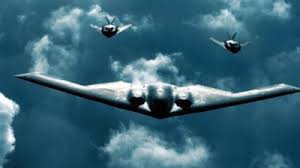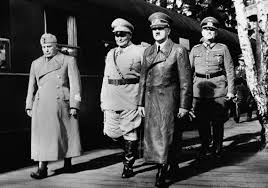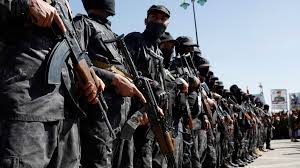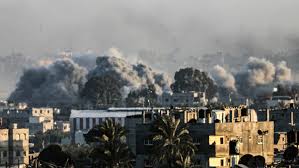Call me Chicken Little, running around shouting that the sky is fallin’ on my head. But I do declare that that World War III has already started. If you take your noses out of your social media cocoons for a bit, and look at the events unfolding across the globe, it’s not hard to miss the evidence.
Global powers are engaged in a series of conflicts and confrontations, and it’s becoming increasingly difficult to deny that we’re witnessing the early stages of a global war.
Take recent strikes carried out by the United States in Yemen a few hours before I sat down to write this. Long-range B-2 stealth bombers were deployed to hit underground weapons storage facilities used by the Houthis, a militant group backed by Iran. This is just one front in a broader struggle. At the same time, (and the news is breaking as I furiously tap this out on my battered keyboard), Israel has launched strikes on Lebanon’s Bekaa Valley, targeting Hezbollah strongholds, while tensions with Iran have risen sharply. Iran fired 180 ballistic missiles at Israel on October 1, and the US has since stepped up its military support for Israel, including deploying its most advanced missile defence system, THAAD, to protect against further attacks.
Doesn’t this feel like the early rumblings of something bigger?
Let me take you back to back to World War II. There were similar tensions and clashes long before the full-scale war was declared. In 1940, the United States wasn’t officially involved in the conflict, but it was sending supplies to Britain and patrolling shipping lanes, all while keeping a wary eye on the growing threat from the Axis powers. (Hitler and his other fascist friends, just to remind you). Today, right this moment, we see a similar situation.
The United States and its Western allies may not have declared a world war, but they are deeply entangled in military conflicts, sending weapons and intelligence to Ukraine, supporting Israel, and countering Iran. The signs of a wider, global conflict are undeniable.
Let’s consider the bigger picture.
In 2022, Russia’s invasion of Ukraine shocked the world, but that’s only one part of a much larger story. Russia, China, Iran, and North Korea are forming a loose coalition, almost reminiscent of the Axis powers of World War II. They are working together in ways that suggest we’re already witnessing the formation of sides in a global conflict. Russia’s war in Ukraine drags on, with support from countries like North Korea, which is supplying missiles and arms. Meanwhile, China flexes its muscles in the South China Sea, challenging US influence in the region, while Iran’s proxy forces in the Middle East grow bolder, striking Israel directly.
If this feels familiar to those of us who are not spring chickens, it’s because history often repeats itself.
In the 1930s, global tensions were rising, but many world leaders were reluctant to acknowledge the danger. Japan invaded Manchuria, Germany rearmed, and Italy embarked on expansion in Africa. These were the early warning signs that led to World War II. Today, we’re seeing a similar series of provocations – Russia’s aggression in Ukraine, Iran’s missile strikes, North Korea’s arms deals, and China’s territorial ambitions. Yet, the world’s leaders don’t seem too eager to address the growing crisis.
The battlefield today looks different from what it did in the 1940s. Modern warfare isn’t just about troops and tanks. We’re now in an era where cyber-attacks, sabotage, economic warfare, and proxy battles define the conflict.
Russian intelligence is engaging in covert operations across Europe, targeting weapons factories and even Jewish symbols in France. China is using its economic power to influence global politics, while North Korea tests missiles with impunity. The US and its allies are busy deploying defence systems and providing military aid, but it’s all part of a wider struggle that feels creepy and suspiciously similar to the early stages of World War II.
Now am I an alarmist if I say there’s a troubling sense of complacency among many political leaders?
Just as in the 1930s, when leaders failed to take decisive action against the rising threats, today’s politicians seem more concerned with domestic issues than the global crisis unfolding.
In the US, the Trump- Harris sparring game is like some bizarre comic show. The upcoming elections are barely addressing the potential for a larger war, even as American forces deploy to protect Israel and support Ukraine. In India, our foreign policy looks like a plate of scrambled eggs. The diplomatic bigwigs are scrambling all over the place: Pakistan, China, Canada! Do we have a policy at all? Are we still non-aligned or have we been thrown totally out of whack?
We’re sleepwalking into a global conflict that could have devastating consequences. History has shown us what happens when we ignore the warning signs, and yet here we are again, on the brink of disaster, with world leaders seemingly unwilling to act.
The alliances being formed, the regional conflicts escalating, and the military posturing all suggest that we’re already in the midst of a world war – one that looks different from anything we’ve seen before, but is just as dangerous.
World War III may not look like World War II, but make no mistake: the signs are all there. It’s time to wake up to the reality that this new kind of war is already underway. The longer we wait to acknowledge it, the harder it will be to turn back.
THE AUTHOR OF THIS PIECE IS FRANK KRISHNER. THE OPINIONS EXPRESSED HEREIN ARE ENTIRELY THOSE OF THE AUTHOR AND NOT NECESSARILY THOSE OF THE EDITOR AND TEAM OF NEWSNET ONE.







I agree that current global tensions bear striking similarities to the prelude of past world conflicts. The growing alignments between powers like Russia, China, Iran, and North Korea, along with the escalation of proxy wars and missile strikes, signal a dangerous trend. Just as in the lead-up to World War II, there is a reluctance among world leaders to confront the full scale of these threats. With cyber-attacks, economic warfare, and regional conflicts intensifying, it’s clear we’re witnessing the early stages of a broader confrontation. Ignoring these signs only increases the risk of a catastrophic global conflict.
Our foreign policy looks like a plate of scrambled eggs! A turn of phrase that is typically Frank Krishner!
Looking forward to more insightful pieces.
Rising global tensions between the United States and its allies and countries such as Russia, China, Iran, and North Korea are similar to pre-World War II patterns of regional conflict and military alliances. While the world is not officially at war, the interconnected crises in Ukraine, Israel, and Taiwan have the potential to grow into a larger, disastrous war. However, diplomatic efforts, economic mutual dependence, and modern warfare dynamics such as cyber war and indirect conflicts may help to avoid a full-fledged world war. The geopolitical landscape remains tensed, with high risk of escalation.
I agree with the opinion piece’s assertion that the world is sleepwalking into a catastrophic conflict, but I also believe that it’s not inevitable. The rising tensions between global powers, escalating nationalism, and unchecked technological advancements do pose significant threats. However, it’s crucial to recognise.
The economic costs of a large-scale conflict would be devastating.